|
|
|
Sort Order |
|
|
|
Items / Page
|
|
|
|
|
|
|
| Srl | Item |
| 1 |
ID:
149284
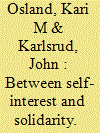

|
|
|
|
|
| Summary/Abstract |
Norway has been a firm supporter of, and contributor to, UN peacekeeping operations. However, while increasing its financial support since the end of the Cold War, Norway has significantly downscaled its troop contributions to the UN, focusing on NATO operations. Rather than interpreting this as lessened interest in the UN, we point out that support and commitment cannot be measured solely in numbers of troops deployed. Norway’s commitment to UN peacekeeping should be understood as part of its strategic culture, here read as a synthesis between self-interest and solidarity, and between the UN and NATO. This article details the institutional, political and material challenges and opportunities for renewed engagement in UN peacekeeping.
|
|
|
|
|
|
|
|
|
|
|
|
|
|
|
|
| 2 |
ID:
149282
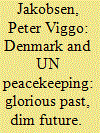

|
|
|
|
|
| Summary/Abstract |
Denmark became a staunch supporter of UN peacekeeping during the cold war because it simultaneously served its interests and values and this winning combination meant that it relatively quickly became internalized as part of Denmark’s foreign policy identity. Denmark turned its back on UN peacekeeping when NATO took over from the UN in Bosnia in 1995. Since then Denmark has prioritized NATO- and US-led operations. The Danish shift was driven by the interest in supporting the Western great powers as well as an altruistic desire to improve United Nations Protection Force’s (UNPROFOR) dismal humanitarian record in Bosnia. This belief was also generated by the positive lessons learned from Denmark’s pioneering use of tanks in UNPROFOR. This tank deployment and subsequent participation in NATO and US-led missions created a new warrior identity. This identity and the Danish interest in maintaining a close relationship to NATO’s great powers make a major Danish return to UN peacekeeping unlikely.
|
|
|
|
|
|
|
|
|
|
|
|
|
|
|
|
| 3 |
ID:
149280
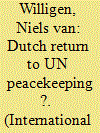

|
|
|
|
|
| Summary/Abstract |
This article covers the Dutch role in UN peacekeeping. The Netherlands has a long tradition of political and military involvement in UN peacekeeping. Like other European countries, its participation decreased considerably from the end of the 1990s onwards. The Dutch only ‘returned’ in 2014 when they delivered a substantial number of troops for the United Nations Multidimensional Integrated Stabilization Mission in Mali (MINUSMA) in Mali. This article starts with putting Dutch participation in UN peacekeeping into an historical context. It continues with an analysis of the reasons for withdrawal and subsequently explores the obstacles and opportunities for a structural return. The article argues that the decision to participate in MINUSMA is mainly explained by national interests and domestic factors. More in particular, government coalition politics explains why the Netherlands sent troops to Mali. In that sense, the Dutch ‘return to UN peacekeeping’ was not part of a structural change in policy-making, but depended for a large part on domestic political dynamics.
|
|
|
|
|
|
|
|
|
|
|
|
|
|
|
|
| 4 |
ID:
149281
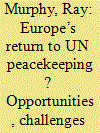

|
|
|
|
|
| Summary/Abstract |
This paper argues that Ireland has been a consistent contributor to peacekeeping since 1958 and examines how the nature of Irish participation has evolved. The maintenance of an effective UN forms a key objective of Irish foreign policy within which peacekeeping and a policy of military neutrality have come to play a central role. In 1993, Ireland revised the legal basis for participation. This brought about a fundamental change in policy, after which participation in peacekeeping not specifically of a police nature was permitted. Ireland displays evidence of both self-interest and altruism in relation to peacekeeping. Unlike many other European countries, it did not ‘withdraw’ from engagement during the 1990s. Despite greater clarity around decision-making processes in recent years, it is still difficult to discern a clear Irish policy strategy. Challenges identified for the future include the changing nature of UN peacekeeping, budget limitations and downsizing of the Defence Forces, legal obstacles to participation in non-UN approved missions, risk assessment, national caveats and a lack of clear doctrine.
|
|
|
|
|
|
|
|
|
|
|
|
|
|
|
|
| 5 |
ID:
149275
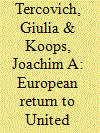

|
|
|
|
|
| Summary/Abstract |
This introductory article outlines the main rationale of the Special Issue and places the topic of the so-called ‘European Return to United Nations Peacekeeping’ in the wider context of recent policy developments and conceptual discussions related to the literature on UN troop contributions. It then outlines some of the key findings of the nine case studies (Denmark, France, Germany, Ireland, Italy, Norway, Sweden, the Netherlands and the United Kingdom) included in this issue. The article concludes that despite a recent engagement of a group of European countries in the Multidimensional Integrated Stabilization Mission in Mali (MINUSMA), expectations of a large-scale ‘return of Europe’ to UN peacekeeping are premature. While the MINUSMA experience will certainly spark important discussions and developments related to the future of UN peacekeeping and Western contributions, European countries will continue to commit only selectively troops on a case-by-case basis and only if a wide range of facilitating factors align as much as they did in the Mali case.
|
|
|
|
|
|
|
|
|
|
|
|
|
|
|
|
| 6 |
ID:
149276
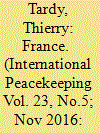

|
|
|
|
|
| Summary/Abstract |
French policy towards UN peacekeeping reflects the ambivalence of what France wants to achieve in the field of conflict management and through which institutional frameworks it prefers to work. On the one hand, France is greatly involved in the design and decision-making process of contemporary UN-led peacekeeping operations. On the other hand, after having been present in the field during the early 1990s, France underwent a major policy shift that led it to distance itself from UN operations. This chapter offers a narrative of French policy and perceptions vis-à-vis the virtues and limits of UN peacekeeping operations in the twenty-first century. It examines the French level of contributions, decision-making process, motivations and lessons learnt from past and current operations. It also analyses the dichotomy between the political role that France plays at the Security Council and its absence from UN-led operations. It seeks to determine how coherent this dichotomy is, its rationale, and how likely – and under what conditions – it will change in the near future, in particular through a hypothetical French return to UN-led peacekeeping operations.
|
|
|
|
|
|
|
|
|
|
|
|
|
|
|
|
| 7 |
ID:
149278
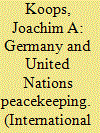

|
|
|
|
|
| Summary/Abstract |
This article examines Germany’s past, present and future approach to UN peacekeeping, particularly in the context of a potential ‘European return to UN Peacekeeping’ and the country’s recent commitment to contribute to the Multidimensional Stabilization Mission in Mali (MINUSMA). By applying a conceptual framework for assessing facilitating and inhibiting factors related to Germany’s past and current participation in UN peacekeeping operation, the article argues that core reasons for German troop contributions range from bilateral partnerships and multilateral pressures, to the role of individual policy entrepreneurs and inter-organizational aspects. Yet, Germany’s culture of restraint and public scepticism towards military operations act as important inhibiting factors. Most crucially, Germany has since the early 1990s pursued an instrumentalist approach to UN peacekeeping in order to strengthen its international profile within a discourse of ‘assuming more responsibility’, to advance ‘normalization’ in security affairs and to enhance internal political and external bilateral security cooperation schemes. Germany’s recent commitment to MINUSMA and its discourse will not result in a ‘big bang’ return to UN peacekeeping, but rather to selective commitments on a carefully assessed case-by-case basis.
|
|
|
|
|
|
|
|
|
|
|
|
|
|
|
|
| 8 |
ID:
149279


|
|
|
|
|
| Summary/Abstract |
Italy was admitted to the United Nations (UN) in 1955. In a mix of ‘genetic multilateralism’ of Italian society and the ‘institutional multilateralism’ of the Italian Constitution, the UN soon acquired a central position in Italian foreign policy and Italian participation in the UN and its institutions became increasingly active. Italy is the top troop contributor to UN Peacekeeping operations among Western countries. Since the 1960s, Italy has participated in 33 UN Peacekeeping operations. The Italian commitment to the UN faced four main turning points: the launch of the UNOSOM II mission in Somalia (1992), the contribution to the UN Interim Administration Mission in Kosovo (1999), the involvement in Afghanistan and Iraq (2001–05), and the engagement with the UNIFIL II mission (2006). By providing an historical overview of Italy’s approach to UN Peacekeeping and explaining the different engagements and disengagements drive through the shift in the foreign policy priorities of the country and the influence of domestic factors; this article aims to answer to the following questions: ‘How much will Italy be willing to contribute to UN Peacekeeping in the future?’ and ‘Does Italy see other multilateral options (EU and NATO) as alternatives to the UN?’
|
|
|
|
|
|
|
|
|
|
|
|
|
|
|
|
| 9 |
ID:
149283


|
|
|
|
|
| Summary/Abstract |
In June 1993 Sweden contributed 1,041 soldiers to United Nations (UN) missions, making up some 1.5 per cent of the total number of UN troops. Two decades later, the picture looked very different. In June 2013 Sweden only deployed one person to UN-led peacekeeping operations, excluding military observers and staff officers. This article explains the shifts in Swedish contributions to UN peacekeeping. It does so by first providing a background to Swedish historically strong support for UN peacekeeping, examining Sweden’s policy of neutrality and non-alignment as well as sense of moral duty to champion a more equal world order. This is followed by a discussion on the sharp decline in Sweden’s participation from the mid-1990s and its underlying reasons, such as the desire to transform the Swedish Armed Forces. The ensuing section considers Sweden’s participation in UN peacekeeping today, which expanded with the deployment of Swedish peacekeepers to the UN Multidimensional Integrated Stabilization Mission (MINUSMA) in Mali. Finally, possible future scenarios are outlined. While Sweden is expected to continue to resolutely support the UN and its efforts, international security developments, particularly those close to home, together with financial considerations will likely be decisive to Sweden’s future contributions to UN peacekeeping.
|
|
|
|
|
|
|
|
|
|
|
|
|
|
|
|
| 10 |
ID:
149277


|
|
|
|
|
| Summary/Abstract |
This article analyses the United Kingdom’s (UK) approach to United Nations (UN) peace operations and whether Britain is prepared politically, bureaucratically, financially, and militarily to increase its contributions to them. The article begins with an overview of UK engagement with UN peacekeeping since 1956 before discussing the political issues that govern British decisions about peacekeeping. The third section then assesses several challenges that would need to be addressed in order for the UK’s increased participation in UN missions to be effective. Finally, the article outlines the main factors pushing the UK towards greater engagement with UN peace operations, including opinions voiced by select domestic, international, and institutional audiences.
|
|
|
|
|
|
|
|
|
|
|
|
|
|
|
|
|
|
|
|
|